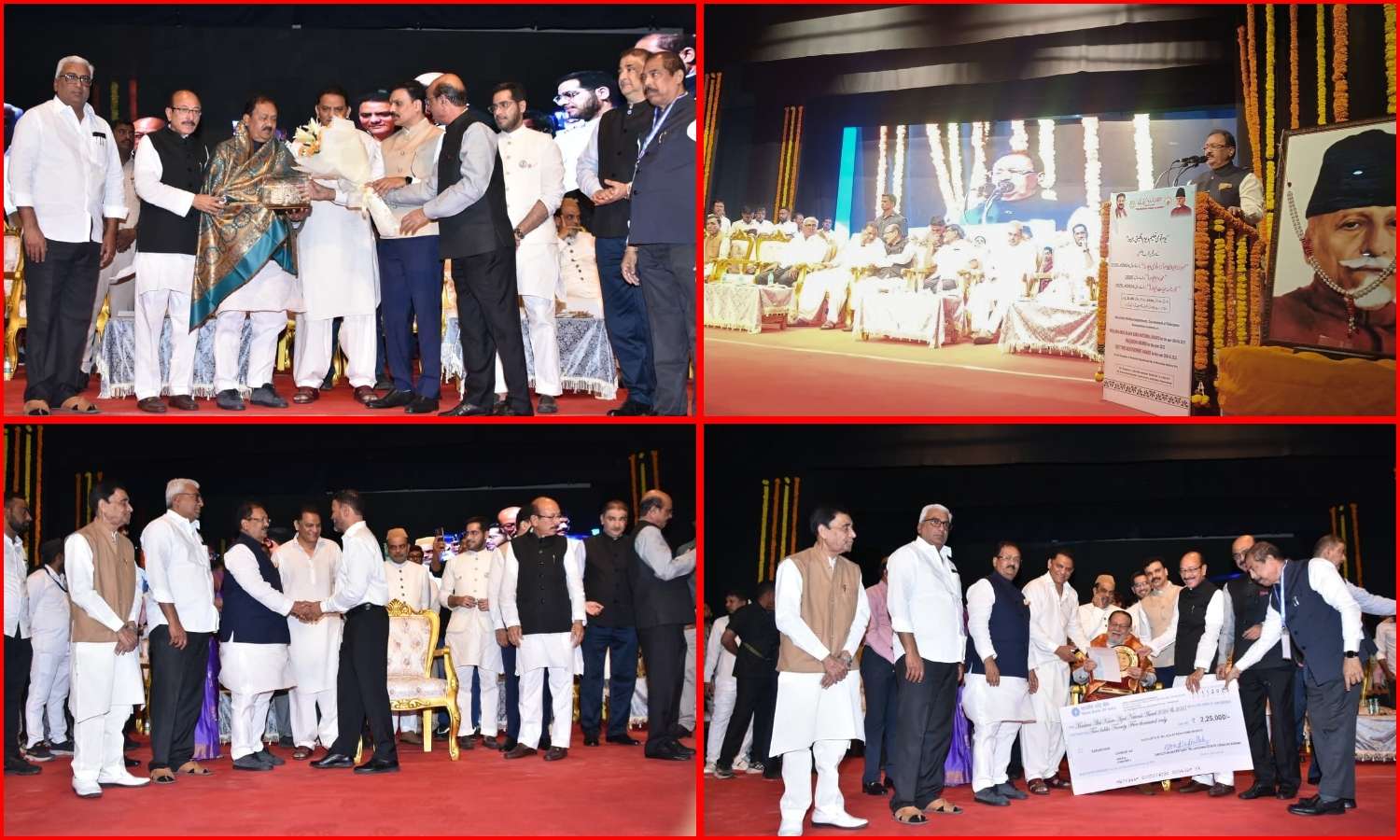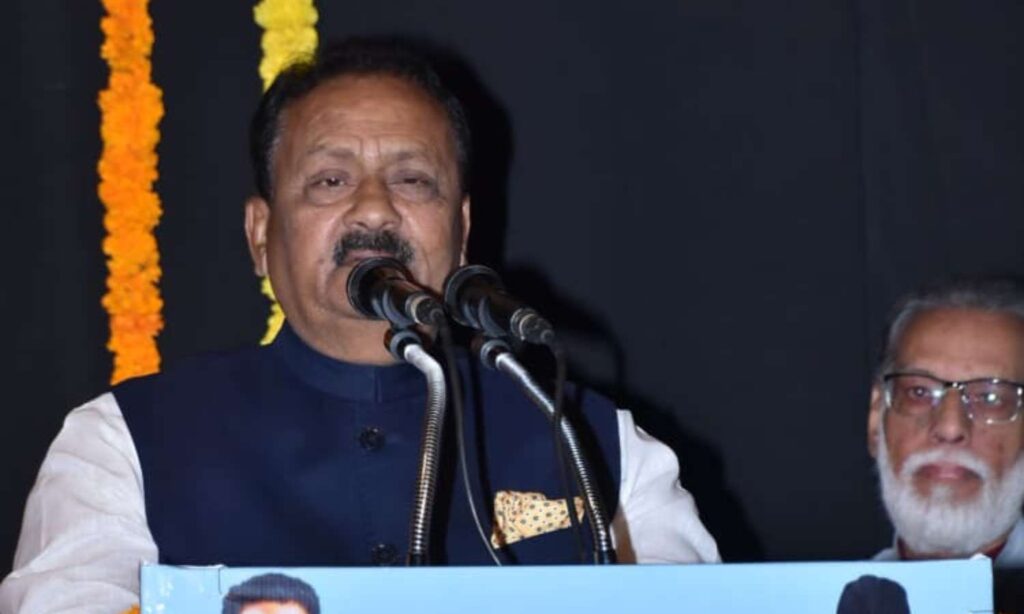- At Moulana Azad’s 137th birth anniversary, Shabbir Ali highlights Muslim reservation benefits and calls education the key to equality
Hyderabad, November 11: Advisor to the Telangana Government and senior Congress leader Mohammed Ali Shabbir called for a collective renewal of Moulana Abul Kalam Azad’s ideals of unity, education, and empowerment during the National Education Day and Minorities Welfare Day celebrations at Ravindra Bharathi on Tuesday. The event marked the 137th birth anniversary of the freedom fighter, scholar, and India’s first Education Minister.
The programme was attended by Minorities Welfare Minister Md Azharuddin, Urdu Academy Chairman Taher Bin Hamdan, and other heads of minority institutions. On this occasion, the Moulana Abul Kalam Azad National Award, Makhdoom Award, and Lifetime Achievement Awards were presented to several personalities for their contribution to education and community welfare.
Shabbir Ali described Moulana Azad as “a man far ahead of his time” who became President of the Indian National Congress at just 35 years of age in 1923, when the subcontinent included present-day Pakistan, Bangladesh, and Burma. He reminded that Azad again led the Congress during the Quit India Movement from 1940 to 1945, steering the nation through its most intense phase of struggle for independence.
He pointed out that Moulana Azad spent nearly ten years in British prisons, longer than most of his contemporaries, including Mahatma Gandhi, Jawaharlal Nehru, and Sardar Vallabhbhai Patel. “He endured long imprisonments, especially in Ahmedabad Jail, without bitterness, using those years to reflect and write. His prison letters became Ghubar-e-Khatir, one of the finest works of thought and faith,” Shabbir said.
In a sharp remark, Shabbir Ali questioned the RSS and BJP leaders over their contribution to India’s independence struggle. “Moulana Azad spent ten years behind bars for the nation. Can the RSS or BJP show even a single leader who spent one month in jail for India’s freedom?” he asked.
He accused the BJP and RSS of distorting history to undermine the sacrifices of freedom fighters from all communities. “It is unfortunate that those who did not shed sweat or blood for independence now call themselves patriots and question the role of the very people who won us freedom,” he said.
After Independence, he said, Azad laid the foundations of modern Indian education by establishing the University Grants Commission (UGC), strengthening the Indian Institute of Science and CSIR, and launching institutions like the IITs, beginning with IIT Kharagpur in 1951.
“Azad declared that education must be free and compulsory for every child up to the age of 14, long before it became a constitutional right,” Shabbir said. “He believed that a country that does not value education cannot hold its head high among nations. Those words must guide us even today.”
Calling Moulana Azad his lifelong inspiration, Shabbir Ali said that Azad’s conviction that true freedom comes through education and self-reliance guided his work as a Minister in the Congress government led by Dr Y.S. Rajasekhara Reddy.
“It was that belief which led us to implement the 4% Muslim reservation in 2004-05,” he said. “That one decision opened doors of higher education and employment to over 22 lakh poor Muslim students in Telangana and Andhra Pradesh. Many of them are now doctors, engineers, MBAs, and civil servants. Their success is the living continuation of Moulana Azad’s dream – that no child should be denied learning due to poverty or religion.”

Citing the latest figures, Shabbir Ali said that the policy’s benefits are visible in every professional stream. “This year, as many as 1,245 Muslim students were admitted to medical courses this year under the reservation policy, including 868 students in free A-category seats,” he said.
He added that Telangana and Andhra Pradesh today have six medical colleges, one law college, and several engineering, pharmacy, management, and polytechnic institutions that were established during the Congress regime between 2004 and 2014. “This expansion gave thousands of students access to professional education,” he said.
He also noted the employment gains for minorities after the Congress government took office in 2023. “In police recruitment, 615 Muslim candidates, from constables to sub-inspectors, were selected. In the 2024 DSC School Education recruitment, 373 Muslim candidates secured appointments. Similarly, 513 MBBS lecturers were appointed through direct recruitment, and 392 medical staff, including doctors and nurses, joined public service,” he said.
“Altogether, 2,282 government jobs were secured by minorities in the past year. In Group-I services, 37 Muslim officers were selected, marking a significant change. This is an inqilab – a revolution – for our youth who were once absent from higher positions in government,” he added.
He recalled that under the previous Congress government, thousands of institutions were approved, including hundreds of engineering and professional colleges, and that even now, expansion continues. “We added two new pharmacy colleges at Jagtial and Hyderabad, a new engineering college – Madina Engineering College – in Mahabubnagar and a new law college in Hyderabad,” he said.
Shabbir Ali urged the community to focus its energies on education rather than distractions. “Instead of discussing global conflicts late into the night, we must ask why our children are not attending schools and what we can do to change that,” he said. “Progress won’t descend from above – it has to rise from within the community.”
He called on community leaders, teachers, and parents to work with the government to identify gaps and promote regular school attendance. “Education is the key to our progress; social reform must begin with classrooms,” he said.
Praising Chief Minister Revanth Reddy’s vision, Shabbir Ali highlighted the ‘Integrated Young India’ initiative, which proposes clusters of four schools – for minorities, SCs, STs, and BCs – built on a shared 25-acre campus, each on a five-acre plot. “This model of integration, already approved for 76 campuses this year and 121 more by next year, will strengthen equality and brotherhood among future generations,” he said.
He also congratulated the newly appointed Minorities Welfare Minister Md Azharuddin and expressed confidence that several new welfare schemes will be implemented under his leadership.
Shabbir Ali concluded by congratulating the award recipients and urging everyone to adopt a “positive mindset” to move forward. “The best tribute to Moulana Azad is to educate every child, empower every family, and build an India where justice, equality, and knowledge are our shared strength,” Shabbir Ali said. (eom)
